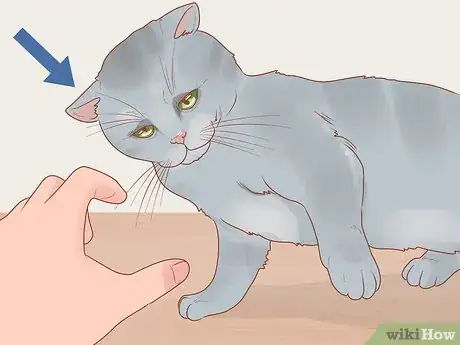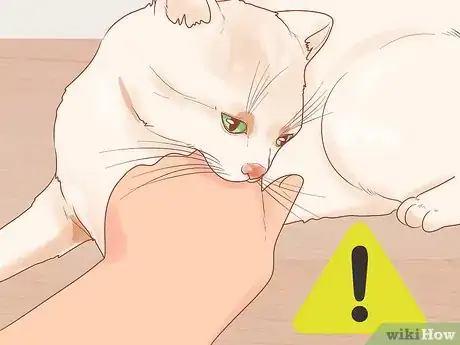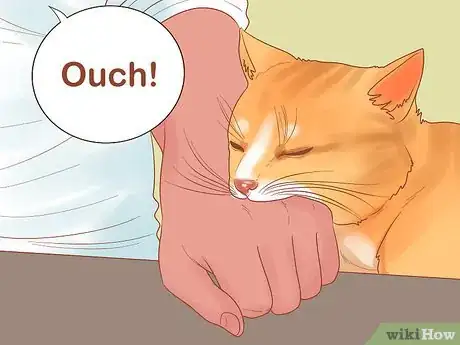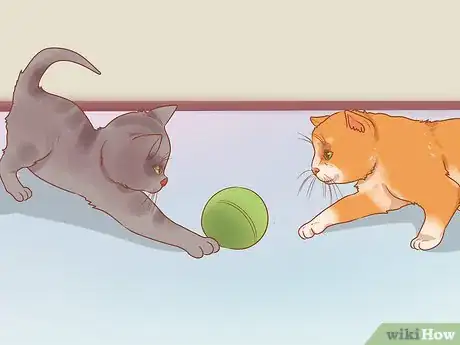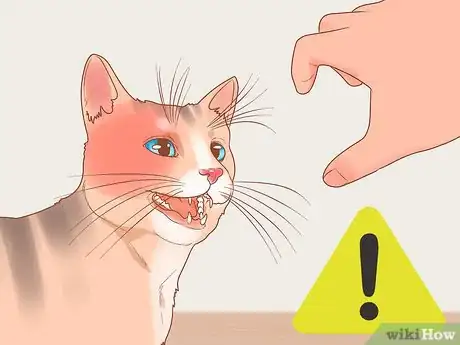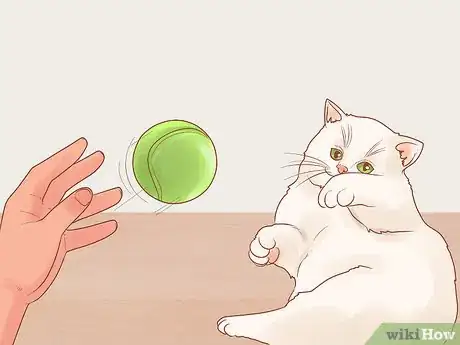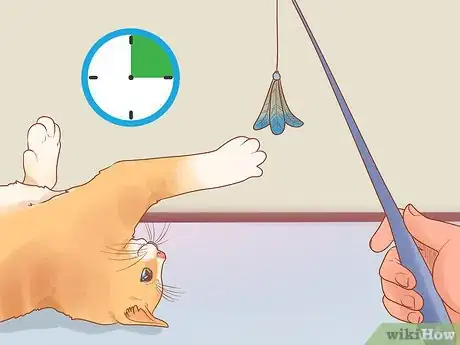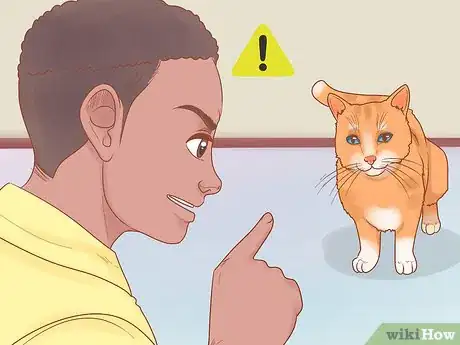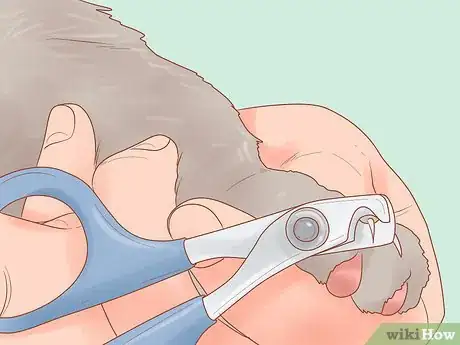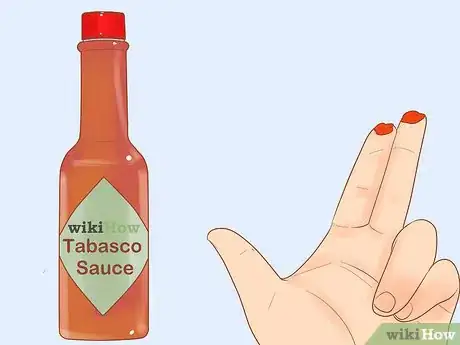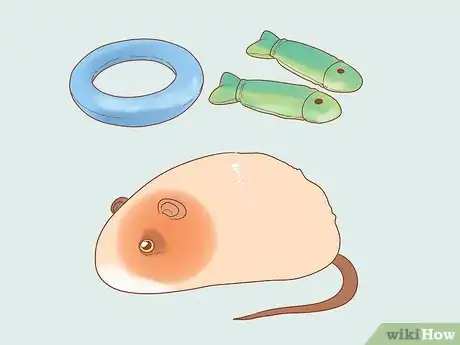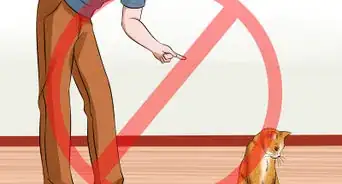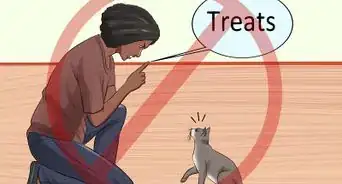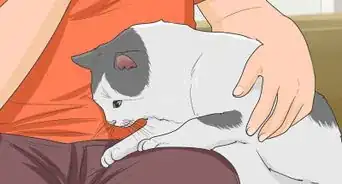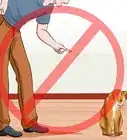This article was co-authored by Deanne Pawlisch, CVT, MA. Deanne Pawlisch is a Certified Veterinary Technician, who does corporate training for veterinary practices and has taught at the NAVTA-approved Veterinary Assistant Program at the Harper College in Illinois and in 2011 was elected to the board of the Veterinary Emergency and Critical Care Foundation. Deanne has been a Board Member of the Veterinary Emergency and Critical Care Foundation in San Antonio, Texas since 2011. She holds a BS in Anthropology from Loyola University and an MA in Anthropology from Northern Illinois University.
This article has been viewed 15,905 times.
Cats learn how to play nicely as kittens. By tumbling around with their littermates, kittens learn when biting and scratching crosses over the line from play to aggressive behavior. Of course, cats sometimes have a hard time learning how to play nice. Biting, scratching and other forms of play aggression can be mitigated with appropriate training, stimulation and design of living and play spaces.[1]
Steps
Stopping Bad Behavior During Play
-
1Recognize play aggression. If your cat's ears flatten, its tail flickers and it stares at you, it may be exhibiting play aggression.[2] However, it shouldn't look like your cat is in pain. There shouldn't be any growling or hissing sounds, which could indicate more serious forms of aggression due to physical pain or injury.[3]
- If your cat is exhibiting aggression and you don't know if it is play aggression or aggression due to a serious illness, you should get it checked out by a veterinarian.
-
2Relax your extremities when bitten. If your cat bites an extremity and you become tense or pull away quickly, they will instinctively double down on the bite. To avoid this scenario, you should simply relax your extremity, which should induce your cat to let go of you. [4]Advertisement
-
3Say “ouch” and gently pull away. If your cat scratches you, you can firmly say “ouch” to indicate that they have hurt you. Then, gently pull your body away from their grasp.[5]
- Avoid yelling, which could make matters worse.
-
4Remove yourself from the play session. If your cat is biting or scratching and will not stop the aggressive behavior, simply walk away from the situation. Go to a different room and avoid contact with your cat to indicate the end of the session. Your cat should eventually learn that the bad behavior leads to the ending of a play session.[6]
- Avoid picking up or moving your cat after they exhibit bad behavior since your touch could indicate a reward for the bad behavior.
- If your cat acts out very briefly and you don't want to end the play session, you can use a short, five-second timeout. Your cat will realize that the biting or scratching results in the loss of their playmate. After five seconds, you can resume the play session. If the aggressive behavior continues, you should end the play session.[7]
- Some cats only like to be played with and pet in a certain way. If your cat won't stop biting and scratching, try changing how you play with it and see if that helps.
Training Your Kitten to Play Nice
-
1Give your kitten time to socialize and learn how to play. You should give them at least the first two weeks of their life to socialize with their mother and littermates since separation during this stage often results in aggressive behavior. Kittens learn how to play by interacting with their littermates and mother. For instance, if they bite one of their littermates too strongly, the reaction of the littermate will stop them from biting inappropriately.[8]
- If kittens are not given sufficient time to socialize with littermates and their mother, they may never learn how to play nicely.[9]
- A lot of social development happens between the second and seventh week of a cat's life, but it isn't until the six-month mark that cats start to really understand the social hierarchy in a household.
- If you get two kittens of about the same age, they will learn how to play nicely with each other. They will understand the pain inflicted by a bite or a scratch, as well as how to reduce such pain by playing nicely.[10]
-
2Don't use your fingers during playtime. If you start playing with your kitten by wagging your fingers or getting them to latch onto your hands, they will assume this is appropriate behavior. Although it might feel fine when they are small kittens, it will be pretty painful by the time they grow up. So, you should never use your fingers during playtime.[11]
-
3Use toys during playtime. By using toys during playtime, you will teach your kitten to direct their attention away from your body and towards an appropriate object, such as a mouse toy. You can use a fishing rod or wand toy, which allows you to keep an appropriate distance between you and your cat while keeping their attention on the toy.
- You could also use wrestling type toys, such as furry animals that your cat can pretend to hunt and tackle.
-
4Schedule a regular playtime. Every day, you should have an interactive play session scheduled with your cat. Preferably, schedule a fifteen-minute session in the morning and another fifteen-minute session in the evening. The predictability of the play sessions will give your cat a crucial outlet, and help stop any acting out or poor behavior.[12]
- Regular playtime can help strengthen the bond between you and your cat.
-
5Avoid punishing tactics. If your kitten bites or scratches you during playtime, you should avoid hitting them or yelling at them. These tactics will make them want to avoid you altogether and will do nothing to stop the biting and scratching.[13]
Using Coping Strategies
-
1Cut your cat's claws. By trimming your cat's claws, you will reduce the pain inflicted by their scratching. Although it won't stop the poor behavior, it can make things more manageable while your cat is learning new habits.[14]
-
2Curb hand biting with bad smells. Apply Tabasco sauce, another hot sauce or a bitter apple sauce to your fingers prior to playtime. If your cat starts biting your hands during playtime, they will start associating the biting behavior with the bad smell and hopefully stop the behavior.[15]
-
3Keep some extra toys in your pocket. If your cat starts attacking you during playtime, pull out a little toy and throw it for them.[16]
References
- ↑ http://www.humanesociety.org/animals/cats/tips/kitten_play.html?referrer=https://www.google.ca/
- ↑ http://www.perfectpaws.com/cat_biting_and_cat_clawing.html#.WO53_1PyveQ
- ↑ http://www.catbehaviorassociates.com/how-to-stop-play-aggression-in-cats/
- ↑ http://www.catster.com/lifestyle/how-to-stop-your-cat-from-biting-you-during-playtime
- ↑ http://consciouscat.net/2012/02/23/play-aggression-in-cats-biting-the-hand-that-teases/
- ↑ http://www.catbehaviorassociates.com/how-to-stop-play-aggression-in-cats/
- ↑ http://www.catster.com/lifestyle/how-to-stop-your-cat-from-biting-you-during-playtime
- ↑ http://www.catbehaviorassociates.com/how-to-stop-play-aggression-in-cats/
- ↑ http://www.humanesociety.org/animals/cats/tips/kitten_play.html?referrer=https://www.google.ca/
- ↑ http://consciouscat.net/2012/02/23/play-aggression-in-cats-biting-the-hand-that-teases/
- ↑ http://www.humanesociety.org/animals/cats/tips/kitten_play.html?referrer=https://www.google.ca/
- ↑ http://www.catbehaviorassociates.com/how-to-stop-play-aggression-in-cats/
- ↑ http://www.humanesociety.org/animals/cats/tips/kitten_play.html?referrer=https://www.google.ca/
- ↑ http://consciouscat.net/2012/02/23/play-aggression-in-cats-biting-the-hand-that-teases/
- ↑ http://www.humanesociety.org/animals/cats/tips/kitten_play.html?referrer=https://www.google.ca/
- ↑ http://www.catbehaviorassociates.com/how-to-stop-play-aggression-in-cats/
About This Article
To stop your cat from biting or scratching during play, firmly say “ouch” and pull away whenever it does so. Even if you're in pain, don’t yell when this happens since your cat might become more agitated and it could just make things worse. Then, walk away and avoid contact with it to teach it that bad behavior means the play session is over. If your cat continues to bite during playtime, try adding hot sauce to your fingers before playing with it so it’ll associate its biting with the bad smell and hopefully not do it again in the future. For more advice from our Veterinary co-author, including how to train your kitten to play nicely, read on!
